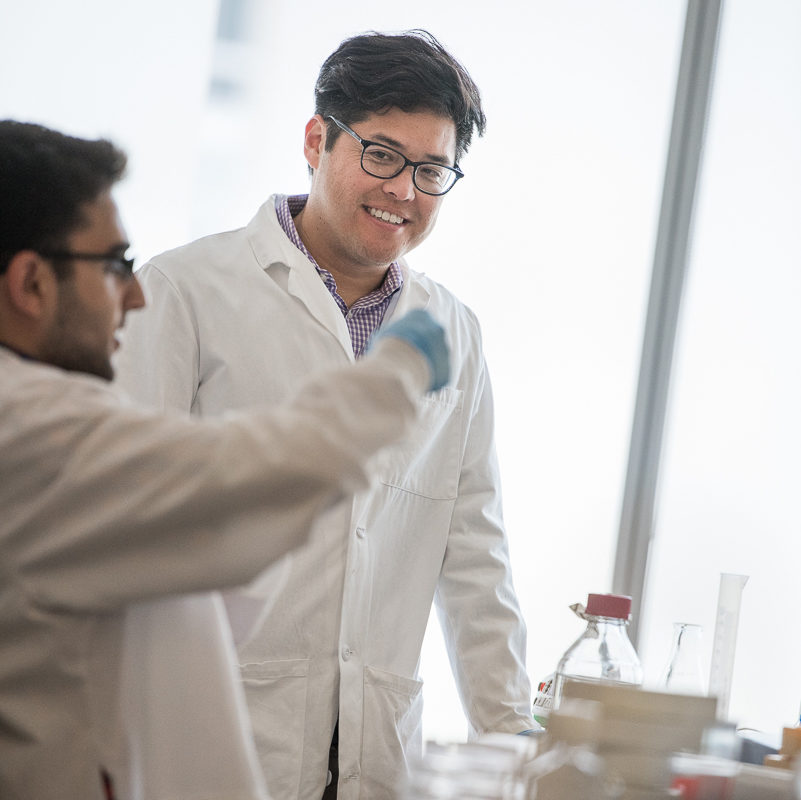
Justin Ichida regularly gets emails from strangers asking an urgent question: Will your research on ALS be done in time to save my life?
“I don’t really know them, but they tell me their whole story,” said Ichida, a scientist with the USC Stem Cell program. “They’ll ask, ‘How long is it going to take for your new drug to reach clinical trials? Or get on the market?’”
He wishes he could have more answers, but there are reasons for optimism. Ichida studies the genetic components of ALS, or Lou Gehrig’s disease, to seek a cure for the progressive neurodegenerative disease. In February, his lab had a breakthrough, pinpointing a drug that seems to halt the progression of the disease in a certain type of ALS. About 10 percent of ALS patients have this type. The advance offered a sign of hope for many ALS sufferers, and for Ichida himself.
He’s in a race against time.
ALS attacks nerve cells in a steady march that leaves the sufferer paralyzed, though mentally alert. Those with ALS generally live only two to five years after diagnosis. With ALS life expectancy so short and limited research dollars dedicated nationally to studying the rare disease, “it’s our responsibility to put in 110 percent to make sure that we’re doing the best possible job in finding a cure for these people,” he said.
The ALS researcher and the Hollywood publicist
He thinks about the women and men who are struggling – patients like Nanci Ryder. Ichida first met the Hollywood publicist, who has ALS, when Ryder visited his lab three years ago. A prolific ALS fundraiser with a ready sense of humor, she could still move and talk then. When her thoughts raced ahead of her impaired speaking abilities, she would write what she had to say on a board. Her ready jokes and sarcastic comments made Ichida laugh.
But recently, when Ichida went to see Ryder at her home, he found ALS had completely paralyzed her. Health aides had put signs up on the wall reading “yes” and “no.” She responded to questions with her eyes, looking to one sign or the other. Yet, her mind is likely as engaged as ever, Ichida said.
Sometimes, he said, her face will change just a small bit, and that means she’s laughing.
It’s relationships with people like Ryder, Ichida said, that sometimes make him wish he could lock his lab door and not emerge until he had the answers to ALS. So many patients, and their spouses and children and parents and friends, so eagerly await them. But taking breaks and shutting off the intensity of the work for a few hours a day enables him to recharge and perform at a higher level when he is working.
Running, working out on an elliptical machine and playing guitar all help. Sometimes he’ll watch television, preferably either a food show or sports. Friends and family are also important. “When it seems like it’s getting too bad, it helps to have the support of people around you,” he said.
Passion drives ALS researcher’s work
Ultimately, though, what drives him forward is a passion for the work. It started as a child when he read Jurassic Park, the novel about the chaos that ensues when a scientist uses genetic engineering to recreate dinosaurs. “The idea that all you needed was DNA to recreate life – I thought that was fascinating,” Ichida said. “I wanted to do that in real life.”
That’s exactly what his lab does, he said. For years, scientists have been stymied by their inability to study living nerve cells, because they are so inaccessible in patients who are alive. But researchers in Ichida’s USC lab managed to take skin cells from people who have ALS and, using DNA, converted those cells into motor neuron cells. Then they could watch those nerve cells act out ALS in a petri dish.
He’s particularly excited about a discovery his lab made this winter. The lab was studying a genetic mutation that is responsible for one tenth of all ALS cases. Researchers figured out that the mutation leads to a defect in the functioning of the cell, causing it to degenerate, Ichida said. The scientists were then able to pinpoint a drug that halted the destruction of the neurons culled from ALS patients.
The next step is to develop the drug for market. Ichida, along with other scientists and investors, has launched a start-up business so he can maintain control over the process. Otherwise, he fears, his discovery for the relatively small ALS market could get nowhere at a big pharmaceutical company with more lucrative targets. “They might have many other things that they are trying to get developed, and yours might not make it all the way,” he said. If, for example, they come up with a promising candidate for an Alzheimer’s disease drug, “they might choose to put in their resources for that because it’s a bigger market,” he said.
That would never do for Ichida, with his inbox full of pleas from patients and their desperate loved ones.
“Your work,” he said, “and how well your research goes, is going to decide how other people’s lives end up.”
